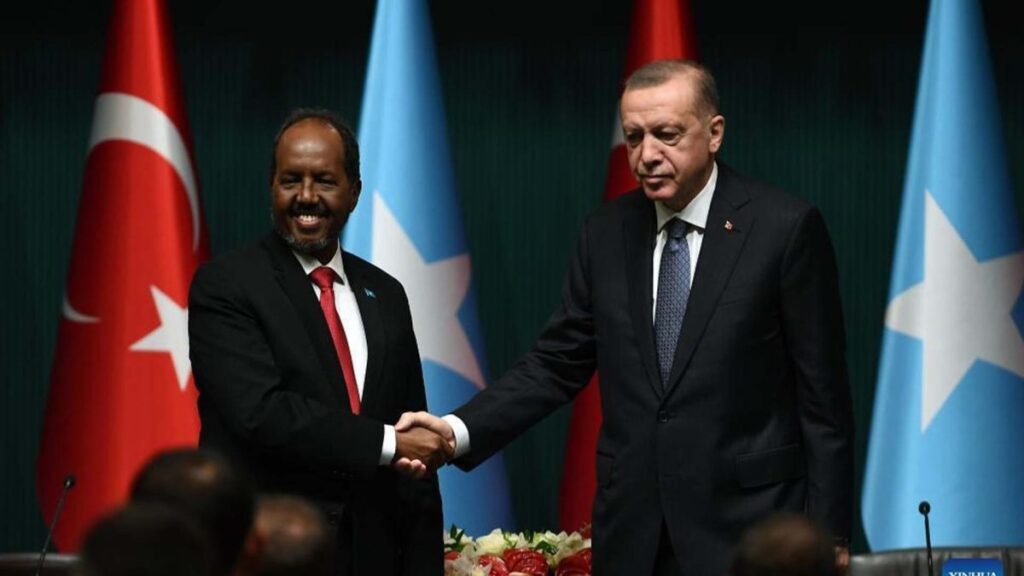May 5, 2025
This analysis provides a critical and impartial evaluation of the recently concluded Somalia-Turkey Oil & Gas Agreement, considering its terms, historical context, multidimensional implications, and stakeholder accountability. It aims to offer insights for various stakeholders, emphasizing areas of concern and potential risks to Somalia’s national interests.
- Critical Evaluation of Agreement Terms
Based on available reports, the Somalia-Turkey Oil & Gas Agreement grants the Turkish state oil company, TPAO, exclusive rights for petroleum exploration and development across Somalia’s onshore and offshore territories. Several clauses warrant critical scrutiny:
- Exclusive Rights (Article 4.1): The agreement awards TPAO a monopoly over Somalia’s hydrocarbon resources, bypassing competitive bidding processes. This deviates from the 2020 Petroleum Law, which emphasizes open and transparent licensing rounds. Analogous agreements in Kenya and Mozambique, while varying in their specifics, often involve competitive bidding or at least the possibility of diverse partnerships. Norway, a mature oil and gas producer, employs a licensing system that allows multiple actors and state participation. The exclusivity granted to Turkey limits Somalia’s ability to secure potentially more favorable terms from other international oil companies.
- Cost Recovery (Article 4.7): TPAO is entitled to recover up to 90% of annual oil and gas production as “Cost Petroleum” before any profit sharing occurs. This high cost recovery threshold significantly delays the point at which Somalia begins to accrue substantial revenues. In comparison, production-sharing agreements (PSAs) in other African nations typically have lower cost recovery limits. For instance, while specific details vary, countries like Kenya and Mozambique often have cost recovery limits ranging from 50% to 70%. Norway, with its sophisticated petroleum management, has a different fiscal regime involving taxes and state participation rather than a high cost recovery percentage. The 90% clause appears unfavorable to Somalia in the initial years of production.
- Absence of Upfront and Ongoing Fees (Article 4.5): The agreement reportedly waives standard financial obligations such as signature bonuses, production bonuses, and surface fees for Turkey. These fees are common in oil and gas agreements globally and provide immediate revenue streams for host governments, which Somalia forgoes under this agreement. The absence of these fees contrasts with practices in Kenya and Mozambique, where such payments are typically included.
- Royalty Cap (Article 4.6): Somalia’s royalty is capped at 5% of production, regardless of profitability. This is significantly lower than international standards, which often range from 10% to 20%. Countries like Norway have a combination of royalties and significant taxes, resulting in a much higher government take. The low royalty rate limits Somalia’s long-term revenue potential from its hydrocarbon resources.
- Dispute Resolution (Article 10 & 12): All disputes arising from the agreement are to be resolved through international arbitration in Istanbul under UNCITRAL framework, effectively excluding Somalia’s domestic legal system and prioritizing Turkish jurisdiction. This raises concerns about potential bias and the accessibility of justice for Somalia. Standard agreements usually provide for international arbitration but may also include options for domestic legal recourse or specific arbitration venues agreed upon by both parties.
- No Obligation for Local Office (Article 4.2): TPAO is not obligated to establish a local office in Somalia until production begins, and even then, it is optional. This could hinder job creation, skills transfer, and the development of local capacity in the early stages of exploration. Many oil and gas agreements include provisions for the contractor to establish a local presence and prioritize local employment.
- Taxation (Article 5): All taxes and duties in connection with the project are to be levied in accordance with applicable laws in the Parties’ states, taking into account a 2016 avoidance of double taxation agreement between Turkey and Somalia. The implications of this need further scrutiny to ensure Somalia’s tax rights are adequately protected.
- Change of Law (Article 8.3): If any change in Somali law increases Turkey’s costs, Somalia is obligated to pay the difference from its own profit share. This provision significantly constrains Somalia’s legislative autonomy over its natural resources and places a disproportionate financial risk on Somalia.
Comparison with Analogous Agreements:
The preliminary assessment suggests that the terms of the Somalia-Turkey agreement appear less favorable to the host nation compared to typical agreements in Kenya, Mozambique, and Norway. These nations generally feature more balanced revenue-sharing arrangements, upfront payments, higher royalty rates, and greater emphasis on local content and legal jurisdiction.
- Historical Context
Somalia has a long history of oil and gas exploration, dating back to the 1940s. International oil companies, including major players like ExxonMobil, ConocoPhillips, BP, Shell, and ENI, held large concession agreements in the country between the 1950s and 1990. Promising test wells and geological similarities to oil-rich regions suggested significant potential.
However, the onset of the civil war in 1991 led to a halt in all exploration activities, with companies declaring force majeure. Despite the instability, the belief in Somalia’s hydrocarbon potential persisted, fuelled by discoveries in neighboring East African countries like Mozambique, Tanzania, and Kenya.
In 2012, the establishment of the Federal Government of Somalia marked a renewed effort to develop the oil and gas sector. The government gradually set up a legal framework, including the 2020 Petroleum Law and the establishment of the Somali Petroleum Authority (SPA) in the same year. Licensing rounds were initiated, aiming to attract international investment.
A significant challenge has been the dispute between the Federal Government and Federal Member States over the ownership and management of petroleum resources. The 2018 Petroleum Ownership Management and Revenue Sharing Agreement aimed to address these issues, stipulating revenue sharing proportions between different levels of government.
The maritime boundary dispute with Kenya, particularly over an area believed to be rich in oil and gas, has also been a major geopolitical disruption. The International Court of Justice (ICJ) ruled largely in favour of Somalia in 2022, but Kenya rejected the ruling, creating ongoing tensions. This unresolved dispute could affect offshore exploration and development activities.
The current progress includes the availability of legacy seismic data and more recent surveys. However, the delineation of specific blocks and the resolution of territorial disputes remain critical factors influencing investor confidence and the pace of development. The Somalia-Turkey agreement was signed against this backdrop of both potential and persistent challenges.
- Multidimensional Implications
- Economic: Projections of the fiscal impacts of oil and gas development in Somalia vary, but the potential for significant revenue generation exists if resources are commercially viable and managed transparently. However, under the current terms of the agreement, Somalia’s returns in the initial phases are likely to be limited due to the high cost recovery provision and the absence of upfront fees. The risk of resource dependency is significant, and economic planning must account for global oil price volatility and the long-term shift towards cleaner energy sources. Employment opportunities directly from oil and gas extraction might be relatively limited due to the capital-intensive nature of the industry. Broader economic benefits will depend on local content requirements (which are weak in the current agreement) and how resource revenues are reinvested in other sectors.
- Political: The agreement carries significant implications for federal-state resource governance. The absence of formal parliamentary ratification raises concerns regarding transparency and adherence to Somalia’s legal framework. This could intensify existing tensions between the federal government and member states concerning resource control. Furthermore, Turkey’s growing strategic influence in the Horn of Africa, facilitated in part by this agreement and its security cooperation with Somalia, has the potential to reshape regional power dynamics. The risk of corruption associated with oil and gas revenues presents a serious challenge, particularly without robust oversight mechanisms and public disclosure.
- Social: Community displacement risks associated with onshore and offshore infrastructure development need careful consideration. International best practices emphasize the need free, prior, and informed consent, resettlement action plans, and fair compensation. Environmental degradation from oil spills, gas flaring, and waste disposal is another critical concern that requires robust environmental safeguards and enforcement. Mechanisms for equitable benefit sharing, such as local content quotas in employment and procurement, and community development agreements, are crucial to ensure that local populations benefit from resource extraction. The current agreement appears weak on these aspects.
- Stakeholder Accountability
Clarity on oversight mechanisms, public disclosure requirements, and the enforcement of environmental and social safeguards is paramount for ensuring accountability. The absence of a requirement for real parliamentary ratification of the agreement raises significant concerns about democratic oversight and the legitimacy of the deal. Meaningful civil society engagement in the negotiation and implementation phases is essential for ensuring transparency and accountability. The lack of provisions for independent audits of revenue flows and environmental/social compliance further weakens accountability.
- Deliverable Tone & Style
This analysis maintains an academic rigor, grounding its critiques in legal, economic, and historical evidence derived from available reports and general knowledge of international best practices in oil and gas governance. It avoids speculative language, focusing on the potential implications based on the terms of the agreement and comparative analysis.
Actionable Recommendations:
- Transparency: The full text of the Somalia-Turkey Oil & Gas Agreement should be made public immediately to allow for comprehensive scrutiny by all stakeholders.
- Parliamentary Review: The Federal Government should urgently submit the agreement to the Somali Parliament for review and ratification, thereby adhering to the principles of democratic governance and resource ownership enshrined in the constitution. The agreement was passed without affording the parliament an opportunity to review its contents, as it was not even made available.
- Renegotiation: Given the preliminary assessment highlighting potentially unfavourable terms, the Federal Government should consider renegotiating key clauses, particularly those related to cost recovery, royalty rates, upfront fees, local content, and dispute resolution, to better align with international standards and Somalia’s national interests.
- Strengthening Oversight: Establish independent oversight mechanisms involving the Somali Petroleum Authority, civil society organizations, and international experts to monitor the implementation of the agreement, ensure revenue transparency, and enforce environmental and social safeguards.
- Stakeholder Engagement: Develop a framework for meaningful and continuous engagement with Federal Member States, local communities, and civil society organizations throughout the lifecycle of the project.
- Legal and Regulatory Reform: Review and strengthen existing petroleum laws and regulations to ensure they prioritize transparency, accountability, environmental protection, and equitable benefit sharing.
- Capacity Building: Invest in building the capacity of Somali institutions, including the SPA and relevant ministries, to effectively manage and oversee the oil and gas sector.
- Environmental and Social Impact Assessment: Conduct thorough and independent environmental and social impact assessments before any major exploration or development activities commence, with clear mitigation and compensation plans.
By addressing these critical points and implementing these recommendations, Somalia can strive to ensure that the development of its hydrocarbon resources contributes to sustainable and inclusive economic growth while safeguarding its national interests and the well-being of its people. The current agreement, in its reported form, presents significant risks that need to be carefully considered and mitigated.

